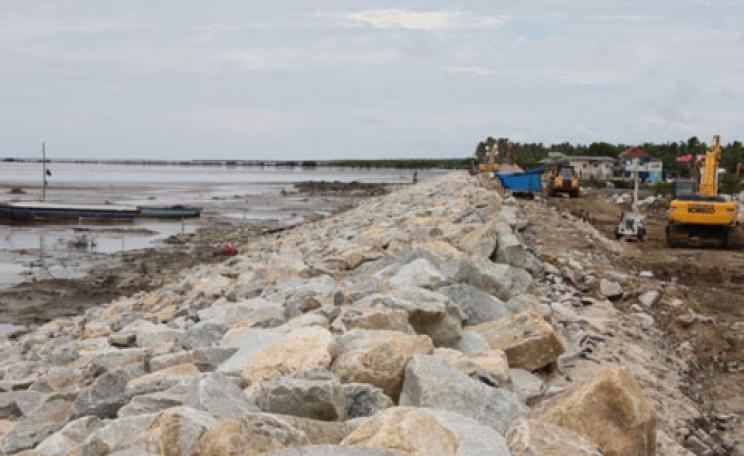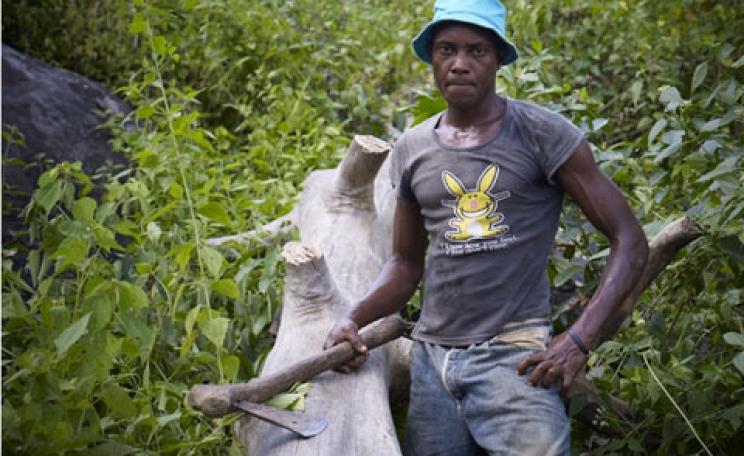According to Kofi Annan, former Secretary-General of the United Nations, 'for good or ill, we live in an age of interdependence, and we must manage it collectively'. Nowhere is that observation more applicable than in dealing with climate change.
Lifestyles led by people in the developed world caused and continue to exacerbate climate change, the effects of which are felt globally.
Figures produced by the New Economics Foundation show that before the average UK citizen is six months old they will be responsible for the same carbon dioxide emissions as a Tanzanian generates in their entire lifetime.
Indeed, Africa as a whole is responsible for less than four percent of global carbon emissions. But it is developing nations that suffer first and are most vulnerable.
‘West Africa is obliged to respond to a situation we are not responsible for and that is a source of iniquity,’ says Professor Isabelle Niang, co-ordinator for UNESCO's adaptation to climate and coastal change project in West Africa.
Banc d'Arguin
But it is not a one-way street, and climate change impacts in developing countries will also be felt in the developed world.
Mauritania’s Banc d’Arguin is an area of flat low-lying ground about the size of Gambia where the Sahara meets the Atlantic. Sea level rise already witnessed along this coastline will have dramatic effects on bird populations in Europe.
The Banc is a unique environment with particularly abundant marine life because of nutrient-rich water brought to the surface by a coastal upwelling. Every year the national park supports millions of migratory birds. For a third of these birds this is the final destination in their migration but for others it is merely a rest point.
‘It’s the most important crossroads for migratory shore birds in the whole Atlantic. They really need this staging point to refuel: without it they would not reach further south and they could not reach Europe,’ says Antonio Arujo of the Fondation Internationale du Banc d’Arguin.
Birds affected
But the ecology of the area is changing. The distribution of sea grass, which needs to be covered and uncovered by the tide twice a day, is affected by rising sea levels. In areas where eel grass used to grow the water now is too deep to support it.
What do you think? Comment here
The sea grass beds are home to invertebrates - food for the birds. In addition, nesting sites on shrinking islands are repeatedly being washed out by the rising tides.
‘If the Banc d’Arguin can’t accomplish its functions as it is doing now whole populations of wading birds will probably disappear from the Palearctic,’ says Arujo.
‘There is no point England spending millions conserving the Wash if some of that money is not helping preserve the Banc d’Arguin. If the Banc disappears all the efforts made in the Wash will make no sense,’ he adds.
Migration decline
A fall in the UK’s bird population is already being noticed. The Royal Society for the Protection of Birds (RSPB) noted a decrease in the numbers of birds that migrate between the UK and Africa.
Of 36 migrant species, for which it holds long term data, the RSPB found 21 have declined significantly. And studies show that pattern is being repeated across Europe.
Fishing problems
The waters off the Banc d’Arguin are the site of another struggle for survival – that of fish. Fishing is a hugely important industry for West Africa and its waters are plied not only by local fleets but those from the EU, China, Korea and many other countries.
If the sea grass beds of the Banc can no longer act as fish nurseries, Arujo says ‘there would be a crisis in the Spanish fishing industry’.
This would also affect other West African countries, such as Senegal, that fish Mauritanian waters, not to mention all the West Africans that currently consume this fish.
All along the coastline of West Africa fishermen complain of lower catches brought about by many factors including over-fishing but also due to effects of climate change such as rising sea temperatures.
In the words of Ghanaian fisherman, Lucas Kwabla, ‘a disaster has occurred here’. Ten years ago he owned five boats and employed 100 people; now he can only run two boats and has made two thirds of his fishermen redundant.
Fish population
Dr Francis Nunoo from Fisheries Department of the University of Legon has also noticed changes in the sardine catch off Ghana. With sea temperature increases, the strength of the upwelling decreases and fish stocks are reduced.
He explained sea temperature can be a cue for fish reproduction and recorded several failed spawning seasons. This is vital for Ghana, the fourth biggest fish consumer in Africa, where two million people are involved in the fishing industry.
Paul Bannerman, deputy director in the Ghanaian Ministry of Food and Agriculture Fisheries Directorate, says, ‘Ghanaians eat more fish than meat and 800,000 metric tonnes are needed a year, but we only catch about half that.’
This means the country now has to import half the fish it requires.
He added that there are twice as many fishing boats in Ghanaian waters than fish stocks can support, and echoes a point made by a Senegalese fisherman in the recent documentary The End of the Line – that while Europe is happy to take Africa’s fish, it is less happy to take Africans.
Migration
In vast areas climate change is making it more difficult for people to eek out a living. And with the increased pressures on natural resources caused by climate change, migration becomes more attractive.
Most of this migration is relatively local. But it seems logical that some would be towards places not immediately affected by climate change. In the case of West Africa, this means Europe.
Already members of the Forces Auxiliaires patrol the beaches of Morocco at night on the look out for boatloads of people heading for the Canary Islands. At 70km off the coast near Tarfaya, the islands are the closest part of the EU to African shores.
It is not just Moroccans who make the desperate and dangerous journey; migrants include Mauritanians, Nigerians and other West Africans.
A local fisherman mused that while some of these people make it to Europe and return to Africa years later driving a car, the bloated bodies of others are collected from beaches.
Interdependence
As climate change makes life more difficult for Africans already living at the margins of existence, more people are likely to try the risky route to Europe in hope of a better life.
The German Advisory Council on Global Change suggests Europe should spend money on preventative measures such as costal management schemes or irrigation rather than tightening its borders.
One way or other developed countries are going to pay for climate change. As Arujo says, ‘We are all connected and birds are part of the evidence. We can no longer ignore the fact we are all linked to each other. We have to be proactive in helping to solve problems far away from our homes.’
Lynn Morris is part of the Atlantic Rising expedition. Read more on the expedition blog
| READ MORE... | |
 |
BLOG Atlantic Rising: Life in a flooded slum in Freetown Most people love their home town. But what if you lived in a regularly flooded slum? |
 |
BLOG Atlantic Rising: State of the fishing industry in Ghana Unsustainable fishing practices and declining catches are forcing Ghana to start importing fish |
 |
NEWS ANALYSIS Is aid without climate adaptation a waste of time? Aid agencies are well resourced and quick to act, but not enough of them appear to be using their power to tackle the long term problems posed by climate change |
 |
BLOG Atlantic Rising: planting mangroves to fortify coastlines The world's largest ever mangrove planting project is underway in Senegal, providing work, habitat and coastal defence all in one |
 |
BLOG Atlantic Rising: first slavery, then climate change in Gambia When your island goes from slave staging-post to an outpost on the frontier of rising seas, fate has truly dealt you a poor hand... |








